Tehran, Iran
Tehran, Iran
Iranian students of Russian often experience problems with phonetics and pronunciation that hinder their listening comprehension. Pronunciation mistakes and native-language interference are the main problems Iranian students have to face while studying Russian. No textbooks in Iran introduce a comparative analysis of Russian and Persian phonetic systems. This research was an attempt to compare the intonation systems of both languages in order to help Iranian students to master Intonation Pattern No.7 and develop their communication skills in the Russian language. Oral speech of 17 Iranian students was processed phonetically and acoustically using PRAAT 6.2.10. This program used pitch and intensity filters to analyze Russian Intonation Pattern No. 7 and visualize speech sounds as graphs. Intonation is a set of prosodic means that segments and structures speech flow in accordance with the message intended. In both languages, intonation patterns convey meaning and express emotions. In this study, native intonation pool prevented the Iranian students from imitating Russian Intonation Pattern No. 7. This comparative acoustic analysis of Russian and Persian intonation systems will help Iranian students to prevent phonetic, rhythmic, and intonation errors in Russian. The results can be used by students, second-language teachers, speech therapists, and communication specialists.
prosodic units, suprasegment units, phonetics, Russian, Persian, intonation, stress, acoustic analysis, Intonation Pattern No. 7
1. Dastamouz S., Rasouli M. Criticism of the phonetics training program at the undergraduate level of the Russian language in Iran. Necessities, problems and solutions. Critical Studies in Texts and Programs of Human Sciences, Institute for Humanities and Cultural Studies, 2018, 18(8): 75-96. (In Pers.) URL: https://criticalstudy.ihcs.ac.ir/article_3461.html (accessed 30 Nov 2023).
2. Belikov V. I., Krysin L. P. Sociolinguistics. Moscow: RSUH, 2001, 439. (In Russ.) https://elibrary.ru/pwfalv
3. Baharloo H., Dastamooz S., Shirazi A. Analysis of Iranian students’ errors in expressing the Russian interrogative sentences with intonation Construction 2. World of Science, Culture, Education, 2020, (4): 19-23. (In Russ.) https://doi.org/10.24411/1991-5497-2020-00662 EDN: https://elibrary.ru/WWTYHV
4. Madaeni Avval A., Najafi M. M. On the issue of interference of the Persian language in the Russian speech of Persian students (First experience in overcoming interference). Research in Contemporary World Literature, 2004, 9(19): 107-125. (In Russ.) URL: https://jor.ut.ac.ir/article_12281.html (accessed 30 Nov 2023).
5. Nosrati A., Nabati S., Estiri M. Exploring the effect of interference on the phonetic errors committed by the Persian-speaking learners of Russian. Language Related Research, 2021, 12(2): 599-628. (In Pers.) URL: https://lrr.modares.ac.ir/article-14-44144-fa.html (accessed 30 Nov 2023).
6. Svetozarova N. D. Intonation system of the Russian language. Leningrad: SPbSU, 1982, 174. (In Russ.) https://elibrary.ru/tooocb
7. Shchukin A. N. Teaching foreign languages: Theory and practice. 2nd ed. Moscow: Filomatis, 2006, 480. (In Russ.)
8. Balykhina T. M., Ignatyeva O. P. Linguistic didactic theory of error and ways to overcome errors in the speech of foreign students. Moscow: RFUR, 2006, 195. (In Russ.) https://elibrary.ru/pbgzps
9. Zemskaya E. A. Russian as a foreign language. Russian colloquial speech: linguistic analysis and study issued. 6th ed. Moscow: FLINTA, 2021, 240. (In Russ.)
10. Bryzgunova E. A. Sounds and intonation of Russian speech. 3rd ed. Moscow: Rus. iaz., 1977, 279. (In Russ.)
11. Balykhina T. M., Ignatyeva O. P. Linguistic didactic theory of errors and ways to overcome errors in the speech of foreign students. Moscow: RFUR, 2006, 195. (In Russ.) https://elibrary.ru/pbgzps
12. Odintsova I. V. Sounds. Rhythm. Intonation. (+MP3). Moscow: FLINTA, 2020, 368. (In Russ.)
13. Tkach T. G. Description of Russian vowel phonemes system in the aspect of teaching Russian as a foreign language. Pedagogical Education in Russia, 2011, (1): 170-175. (In Russ.) https://www.elibrary.ru/ndkhwt
14. Vahidian Kamiyar T. Prosody: stress, intonation, pause in Farsi. Mashhad: Ferdowsi University of Mashhad, 2001, 224. (In Pers.)
15. Valipur A. Acoustic and articulatory characteristics of speech sounds in the Russian language. Journal of Foreign Language Research, 2007, (35): 75-89. (In Russ.)
16. Baharloo H., Dastamooz S., Shirazi A. Analysis of Iranian students’ errors in expressing the Russian interrogative sentences with intonation Construction 2. World of Science, Culture, Education, 2020, (4): 19-23. (In Russ.) https://doi.org/10.24411/1991-5497-2020-00662 EDN: https://elibrary.ru/WWTYHV
17. Islami M. Phonology: Analysis of the intonation system of the Persian language. Tehran: Samt, 2018, 101. (In Pers.)
18. Kodzasov S. V., Krivnova O. F. General phonetics. Moscow: RSUH, 2001, 592. (In Russ.)
19. Kasatkin L. L., Klobukov E. V., Krysin L. P. Russian language. Moscow: Academia, 2001, 768. (In Russ.) https://elibrary.ru/rbodqx
20. Duryagin P. V. The phonetic realization of Russian pitch accents in contrastive questions and enumeration contexts. Vestnik of Saint Petersburg University. Language and Literature, 2022, 19(1): 81-102. (In Russ.) https://doi.org/10.21638/spbu09.2022.105 EDN: https://elibrary.ru/SIEAHX
21. Bryzgunova E. A. Intonation. Russian grammar, ed. Shvedova N. Yu. Moscow: Nauka, 1980, vol. 1, 96-122. (In Russ.)
22. Sokolova A. Phonetics and Phonology of the Russian language. Brno: Masaryk University, 2021, 84. (In Russ.)
23. Bryzgunova E. A. Emotional and stylistic differences in Russian oral speech. Moscow: MSU, 1984, 117. (In Russ.)
24. Piotrovskaya L. A. Monotonous vs. expressive oral speech. Theoretical and applied linguistics, 2015, 1(4): 64-75. (In Russ.) https://elibrary.ru/vkcnyj
25. Tkach T. G. Introductory and corrective course of practical phonetics of the Russian language for speakers of Persian. St. Petersburg: Zlatoust, 2013, 84. (In Russ.) https://elibrary.ru/zuzokf
26. Haqshenas A. M. Phonetics. 16th ed. Tehran: Agah Publications, 2019, 192. (In Pers.)
27. Rubinchik Yu. A. Grammar of the modern Persian literary language. Moscow: Vost. lit., 2001, 600. (In Russ.)
28. Mohammadi M. R., Dad M. Stress on Russian and Persian words and their interaction from the point of view of Persian language learners. Language Related Research, 2010, 1(3): 153-169. (In Pers.) URL: https://lrr.modares.ac.ir/article-14-1509-fa.html (accessed 30 Nov 2023).


















